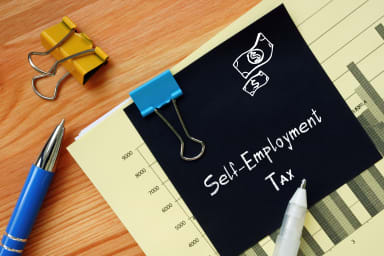If you’re a small business owner, tracking tax deductible expenses is a crucial part of your financial management strategy. Not only can keeping organized records throughout the year save you money come tax season, it will help you save lots of time and effort as well.
When using effective tax deductible expense tracking techniques, you already have the information you need — and it will be well-organized, comprehensive, and accurate.
Keep reading to discover what types of expenses can be deducted, and how our new ZenBusiness Money app can help make keeping track of everything easier than ever.
What expenses can be deducted?
A good expense tracking strategy starts with understanding exactly what can be deducted. In fact, many small business owners miss out on potential tax deductions because they simply don’t know certain expenses can be deducted, or because they don’t effectively keep track of them.
The Internal Revenue Service (IRS) defines business expenses as the costs of carrying on a trade or business. Furthermore, according to the IRS, these expenses are “usually deductible if the business operates to make a profit.”
An expense must be both “ordinary” and “necessary” to the business in order to be deductible. In this instance, “ordinary” just means that the expense is a commonly accepted one in your line of business (such as tables for a restaurant owner). “Necessary” does not mean that the expenses need to be absolutely indispensable, but simply refers to costs that are helpful and appropriate for your business.
Common Tax Deductible Expenses
Some of the most common business expenses that may be tax deductible include:
- Payroll expenses
- Home office expenses
- Rent or mortgage payments (if you buy or rent space in which to operate your business)
- Commercial/business insurance costs
- Company vehicle expenses (and any other professional travel expense)
- Equipment depreciation
- Employee benefit costs
- Retirement plan expenses
- Business-related taxes
- Interest expenses (this refers to interest charged on money you borrow for business expenditures)
- Various types of operating expenses (based on your business type)
It’s also important to note that the rules can vary greatly depending on your business type. For instance, small business taxpayers may account for costs of goods sold very differently from larger companies, and new entrepreneurs may need to “capitalize” (rather than deduct) certain startup costs. Please refer to IRS.gov for specific information, current regulations, and any other specifics you need to know.
How ZenBusiness Money Easily Tracks Tax Deductible Expenses
Once you understand the types of business expenses you need to track, it’s time to start tracking them. This is where we can help.
Automatically Selects Tax Deductible Expenses
Our ZenBusiness Money app pulls in expenses directly from your bank account (once you connect it). It then selects the expenses it believes are tax deductible, and compiles them for tax purposes. All expenses are automatically and instantly organized. You’ll have a full list of itemized deductions automatically.
Make Changes On-The-Go
You can also de-select any items that aren’t tax deductible manually. Just click the box next to the expense, and it disappears. This makes it easy to separate expenses into “tax” and “non-tax.”
Expense Tracking
Additionally, the app displays all of your expense tracking information in one convenient, user-friendly dashboard so that everything you need is right at your fingertips. We make it easier than ever to view, find, sort, and track expenses — bringing your tracking strategy into the future and away from time-consuming manual efforts and the frustration of potentially missed deductions.
Want to compare ZenBusiness Money and QuickBooks? Quickly compare them here.
Tracking Tax Deductible Expenses Manually
If you opt not to use a tax deduction tracker app, you’ll need to keep up with your tax deductible expenses manually. While the old-fashioned way will certainly require more time and effort, here are a few tips to help you organize your strategy and make sure you’re being thorough:
- Pay for all business expenses out of your business bank account (or with a business credit card) to keep personal expenses and business expenses separate.
- Pay for business expenses with checks, debit cards, and credit cards (never cash) to keep expenditures more trackable.
- Keep a log of all business expenses (either in the virtual cloud or in a physical notebook/filing system), with expenditure types separated into categories.
- Keep accurate records of your payroll expenses.
- Keep all bills related to your business (company phone bills, employee cell phone bills, office rent bills, etc.).
- Safeguard all of your expense records (receipts, invoices, bills, etc.).
More Tips for Organizing Receipts and Expenses
As you can imagine, manually keeping your tax deductible expenses list organized can become pretty unwieldy. A great way to compile everything in one place is by maintaining a comprehensive spreadsheet that maps out all expenditures.
You can set your spreadsheet up however you’d like, but we recommend devoting specific tabs to different types of expenses and/or date ranges. You can also split expenses up by category: fixed, variable, period, etc. There are lots of expense tracking spreadsheet templates that you can use to organize your tax deductions.
Better yet, as we’ve already mentioned, you can use a tax deduction tracker app to take most of the manual effort and guesswork out of the entire process.
Our ZenBusiness Money app was created to help you easily track tax deductible expenses, streamline your expenditure information, and make sure no possible deductions slip through the cracks.
Plus, our app isn’t just for tracking expenses. It can also help you make sure you get paid by customers. Use it to easily send custom invoices, accept credit card and bank transfer payments, and manage your clients all from one easy-to-use dashboard.
Download the ZenBusiness Money App
Rely on Tax Experts
The content on this page is for information purposes only, and does not constitute legal, tax, or accounting advice. If you have specific questions about any of these topics, seek the counsel of a licensed professional.
Business Expense Resources
Tax Information and Resources






